

Exhibition 173 Hollywood Road, Sheung Wan, Hong Kong November 26 - December 10, 2022


Boris Kaspiev and the late Richard Price began collecting Asian art in the 1980s, focusing specifically on Himalayan Buddhist and Bon devotional paintings. They con sidered the rarity of the subject matter or iconography, as well as condition to be of great importance. Boris’s interest in Asian art and culture began in childhood, through the influence of his Russian godmother who had lived and collected in Harbin, China, early last century.


01A manuscript page of Mahayana Sutra 一張西藏十四至十五世紀菩薩大般涅槃經

Tibet, 14-15th century Mineral pigment and gold on paper 40 x 12 cm or 15 ¾ x 5 ¾ in.
Provenance Acquired from Suzy Lebasi, Australia on 4 July 2007 Boris Kaspiev, Australia 來源 2007 年 07 月 04 日從蘇西·勒巴斯澳洲收藏購得 鮑里斯·卡斯皮耶夫澳洲收藏
A fine manuscript page on a blue-black ground, with text, and fine and bright illumina tions of two Bodhisattvas possibly Maitreya in white color and Prajñāpāramitā in yellow color. Middle Tibetan inscription: Mahayana Sutra pronounced in Sanskrit, in a style of Kangyur ‘Translation of the Word’. This page came with a yellow silk cover, as well as a page of text, with the script on both sides. The accompanying pages have been preserved separately.


02A two-sided manuscript page depicting the Buddha of the past and present 一張西藏十五至十六世紀释迦佛和彌勒佛手抄描經
Tibet, 15-16th century Mineral pigment and gold on paper 37.5 x 11 cm or 15 x 4 ⅓ in.
Provenance Acquired from Suzy Lebasi, Australia on 9 August 2003 Boris Kaspiev, Australia 來源 2003 年 08 月 09 日從蘇西·勒巴斯澳洲收藏購得 鮑里斯·卡斯皮耶夫澳洲收藏
This is a page from a text enumerating the many names of the Buddha. It belongs to a group of works which, at root, aspire to hasten the coming of the next Buddha Maitreya, by intoning the names of the Buddhas of the past and present.
The title when translated from the Tibetan on the reverse side says that the name of the work is ‘The 5,453 names of the Buddha.’ This is written in Sanskrit transliteration in Tibetan script on the first page of the text.
The reverse side goes on to say: ‘Homage to the Omniscient Ones. The Arhat (Saintly One), the Tathagata (the Buddha Who has gone beyond suffering) who is absolutely stainless….’




03Two paintings depicting Bon tantric masters

兩張西藏十三至十四世紀苯教手描畫
Tibet, 13-14th century Mineral pigment and gold on paper 16.5 x 9.5 cm / 6 ½ x 3¾ in.
Provenance
Private collection Kathmandu, Nepal Acquired from Suzy Lebasi, Australia on 13 September 2006 Boris Kaspiev, Australia Publication TAASA Review September 2015
來源 尼泊尓私人收藏 2006 年 09 月 13 日從蘇西·勒巴斯澳洲收藏購得 鮑里斯·卡斯皮耶夫澳洲收藏 登載 2015 年 09 月 TAASA
The figure in the white cloak reads: ‘(This figure represents) He who is known as ‘The One who is Non-Diverse [in his practice] and Whose Prayers are All-Accomplishing’ and whose secret name is ‘Suppressor of Demons’. Homage to Him!” The writing is in a style known as khyug. The card is marked with the letter A at the top of the reverse telling us that it is num ber 30 in the series.

The figure in the yellow cloak reads: “This figure represents) the Great Acarya (spiritual mas ter) ‘Master of the Phurba’ and whose secret name is ‘Sprouting Shoot of the Letter Ho.’ Hom age to Him.” This card is marked with the letter Sha at the top of the reverse telling us that it is number 27 in the series.
In these painting, the figure in the white cloak is holding a shang, or Bon ritual bell; the figure in the yellow cloak is holding in his right hand a kundika (water sprinkler) used for purifica tion, and a phurba (triple-bladed ritual dagger) in his left. The style of their headwear is one found in similar painting from Mustang, a Tibetan cultural area in northern Nepal.
For similar figure, see the cover of Buddhist Book Illuminations, Pal and Meech-Pekarik, Ravi Kumar, New York 1988 Gerry Virtue collection; and the same image is included in TAASA vol 12 no 1 March 2003 pp14.


04 Two paintings depicting Bon offering deities 兩張西藏苯教十四至十五世紀菩薩手描畫

Tibet, 14-15th century Mineral pigment and gold on paper Each dimension 14.5 x 8.8 cm / 5 ¾ x 3 ½ in.

Provenance
Private collection Kathmandu, Nepal Acquired from Suzy Lebasi, Australia on 26 December 2007 Boris Kaspiev, Australia 來源 尼泊尓私人收藏 2007 年 12 月 26 日從蘇西·勒巴斯澳洲收藏購得 鮑里斯·卡斯皮耶夫澳洲收藏
There are five symbols for the senses of sight, touch, sound, smell and taste. The deity on the left (of the two painting framed together) is offering the gift of smell, and is holding a container in which incense or scent would have been held. The deity on the right is offer ing the gift of sight and is holding a mirror. Script on the reverse.


05Four paintings depicting Bon lamas and deities 四張西藏十七至十八世紀苯教上師菩薩手描畫


Tibet, 17-18th century Mineral pigment and gold on paper Each dimension approximately: 15 x 10 cm or 5 ¾ in x 4 in.
Provenance
Acquired from Suzy Lebasi, Australia on 4 November 2002 Boris Kaspiev, Australia 來源 20012 年 11 月 04 日從蘇西·勒巴斯澳洲收藏購得 鮑里斯·卡斯皮耶夫澳洲收藏
Text: (figure with consort) Life strengthening ceremony - card 12. South. Deity of spring and burgeoning life. Burdened with a heap of good qualities. Body is translucently red and clasping the vase of life elixir… we beseech you to strengthen our life force.
Text: (Figure with crown, turning at an angle, with two figures beneath). Life strengthening ceremony – card 7. From the heavenly realms (arises) the one who was born from a lotus (atop) the watery realms. Nyima Gyaltsen beautiful as if with a banner of victory for in place of his head –here he is with his (spiritual) sons, all three appearing quite lordly. Cleaned of varnish by Suzy but otherwise no restoration.


06

A group of twenty four paintings of Lamas, Mahasiddhas, and ritual items
一套二十四張西藏十八至十九世紀手描畫
Tibet, 18-19th century Mineral pigment on paper 28 x 11 cm / 7 ¼ x 4 ¼ in.
Provenance
Acquired from Suzy Lebasi, Australia on July-October 2008 Boris Kaspiev, Australia
來源 2008 年 07-10月購自蘇西·勒巴斯澳洲收藏 鮑里斯·卡斯皮耶夫澳洲收藏





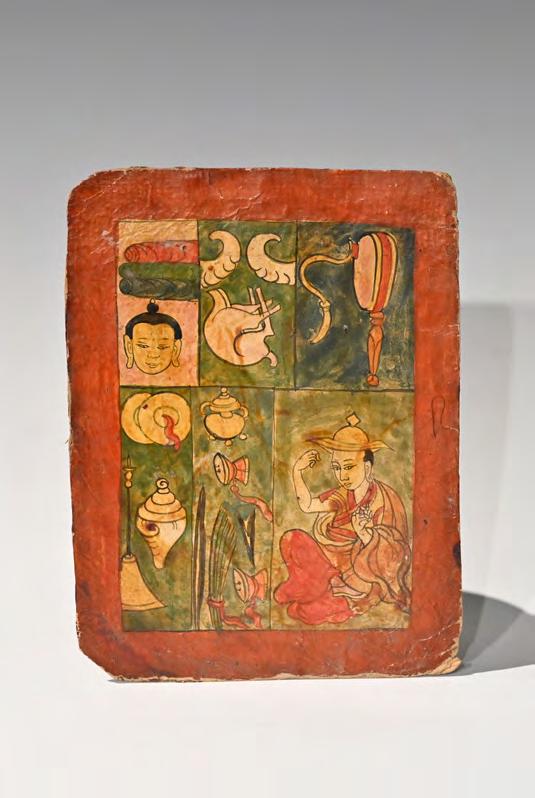






















































07Two paintings depicting pair of yab-yum in dancing form 兩張西藏約十六世紀雙修菩薩手描畫
Tibet, ca. 16th century Mineral pigment and gold on cloth 10 x 9 cm or 4 x 3 ½ in.
Provenance Acquired from Suzy Lebasi, Australia on 18 October 2000 Boris Kaspiev, Australia
來源 尼泊尓私人收藏 2000 年 10 月 18 日從蘇西·勒巴斯澳洲收藏購得 鮑里斯·卡斯皮耶夫澳洲收藏
Each depicting two deities in yab-yum holding bell and drum and dancing on lotus, – one group on the painting in tones of green; the other painting group in red.



A fine painting depicting Begtse 一張蒙古十八晚世紀大红司命手描畫

Mongolia, late 18th century Mineral pigment and gold on cloth 34 x 28.5 cm or 13 ½ x 11 ¼ in.
Provenance Acquired from Suzy Lebasi, Australia on 4 November 2002 Boris Kaspiev, Australia Published Lebasi, The World of Antiques and Art, July-December 2001
Gouache on canvas depicting Begtse, the protector deity of Mongolia, and one of the Dhar mapalas. The wrathful deity brandishing a sword is depicted within an aureole of flames, between the sun and the moon on a light azure sky. He tramples a horse and a corpse on his ‘sun disc’ lotus throne, which is depicted within the landscape of Eastern Tibet. Two minor deities riding on wild beasts flank the central figure of Begtse.


A fine painting depicting Six-armed Mahakala 一張蒙古十八世紀晚期六臂大黑天手描畫
Mongolia, late 18th century Mineral pigment and gold on cloth 42 x 33 cm or 16 ½ x 13 in.
Provenance
Acquired from Suzy Lebasi, Australia on 14 June 2003 Boris Kaspiev, Australia 來源 2003 年 06 月 14
On a pedestal of stylized green and blue lotus leaves, Mahakala stretches the flayed ele phant hide of ignorance behind him and holds implements usual for this form of Mahaka la – the rosary of skulls in his top right hand; the damaru (skull drum) in his middle right hand; and in the bottom right hand he holds the chopper. In his top left hand he holds the trident; in his middle left hand he holds the noose; and in his bottom left hand the skull bowl filled with blood. He strides on the prostrate form of Ganesha. Mahakala has a vajra in his hair, a snake around his neck and wears a necklace of severed heads.
Other figures – top register l-r Yamantaka, Vajradhara, and Simkhavatra Dakini. Mahakala’s four attendants are in the next two registers down. Next register – wrathful red Jinamitra holding a drum and skull cup, then dark blue Takkiraja, also holding a drum and skull cup. Next down – Trakshad riding a black horse and holding a spear. Then on the right Kshetrapala, the Foremost Minister, holding a kirttikha (chopper) and skull cup and riding a bear. Bottom register – Begtse, White Mahakala, Palden Lhamo, and Vaishravana with his jewel-spitting mongoose.
For similar, refer Mongolian Buddhist Art, Volume 1 part 2 Thangkas, Appliques and Em broideries, Serindia, USA, 2011, plate 340 page 766.
References
Demonic Divine, Linrothe and Watt, Rubin Museum of Art, 2004 pp 56, 58-61, 65 and 67. Oracles and Demons of Tibet, de Nebsky-Wojkowitz, Book Faith India 1996, pp38-41.



10A painting depicting Raktakruddha Varahi 一張蒙古十九世紀金剛瑜伽母手描畫


Mongolia, 19th century Mineral pigment and gold on cloth 11 x 9 cm or 4 ⅓ x 3 ½ in.
Provenance Acquired from Suzy Lebasi, Australia on 4 November 2002 Boris Kaspiev, Australia 來源 2002 年 11 月 04 日從蘇西·勒巴斯澳洲收藏購得 鮑里斯·卡斯皮耶夫澳洲收藏
A richly gold painted Mongolian painting (Burhany Zurag) of the red Raktakruddha Vara hi, the consort of Chakrasamvara, e ncircled by flames, dances in ardhaparyanka asana on a corpse, which lies on a sun disc and lotus within a crossed triangular mount, symbol izing method and wisdom. She brandishes a kharttika (chopper) in her outstretched right hand, and in her left hand she holds a blood-filled skull cup. In the crook of her left hand is a khatvanga, or staff. Her naked body is adorned with a crown of five dry skulls, bone ornaments and a garland of freshly severed heads. In her flaming red hair is a sow’s head, which gazes up to the paradise realm of dakinis. Seated above her in the clouds is the four-armed Prajnaparamita. Raktakruddha Varahi is surrounded by the four directional dakinis. Clockwise from top left – Padma Dakini; Karma Dakini; Vajra Dakini and Ratna Dakini.
The visualization of Raktahruddha Varahi is employed in the chod practice for cutting through strong attachments. On the reverse, there are six sets of the blessing and empow erment mantra ‘Om Ah Hum’ for each of the six figures on the front side.
Reference
Mongolian Buddhist Art, Volume 1 part 2 Thangkas, Appliques and Embroideries, Serin dia, USA, 2011, plate 309 page 700 for similar.


11A painting depicting Yama

一張蒙古十九世紀炎魔手描畫
Mongolia, 19th century Mineral pigment and gold on cloth 11 x 9.5 cm / 4 ½ x 3 ¾ in.
Provenance Acquired from Suzy Lebasi, Australia on 3 May 2003 Boris Kaspiev, Australia
來源 2003 年 05 月 03 日從蘇西·勒巴斯澳洲收藏購得 鮑里斯·卡斯皮耶夫澳洲收藏
A fine Mongolian Burhany Zurag depicting Yama, the lord of death, with his sister Yami. Standing on top of the bull which represents our uncontrolled lusts, ‘Yama the lord over death’ strikes his vajra-chopper which symbolizes cutting Wisdom a way from ignorance into the skull-cup containing the Wisdom elixir. In other words he represents the truth that death brings to the Buddhist practitioner – that even in death We can still become enlightened. His red hair flies upwards in the hot air which rises from the hell-realms over which Yama is the lord.


12A painting depicting Mongolia or Buriatia Palden Lhamo 一張蒙古或布里亚特十九世紀帕吉祥天母手描畫

Mongolia or Buriatia, 19th century Mineral pigment and gold on cloth 12 x 11 cm or 5 ¼ x 4 ¼ in.
Provenance Acquired from Suzy Lebasi, Australia on 3 May 2003 Boris Kaspiev, Australia 來源 2003 年 05 月 03 日從蘇西·勒巴斯澳洲收藏購得 鮑里斯·卡斯皮耶夫澳洲收藏
Inscription in red on reverse says ‘Om Ah Hum Svaha.’

Stylistically, this painting may be from Buryatia [also spelled Buriatia] (a part of southern Russia north of Mongolia).
See Figures 19-24 but particularly 23, from Art of Buriatia, Buddhist Icons from Southern Siberia, by Ashencaen and Leonov, Spink, 1996 for a similar painting.

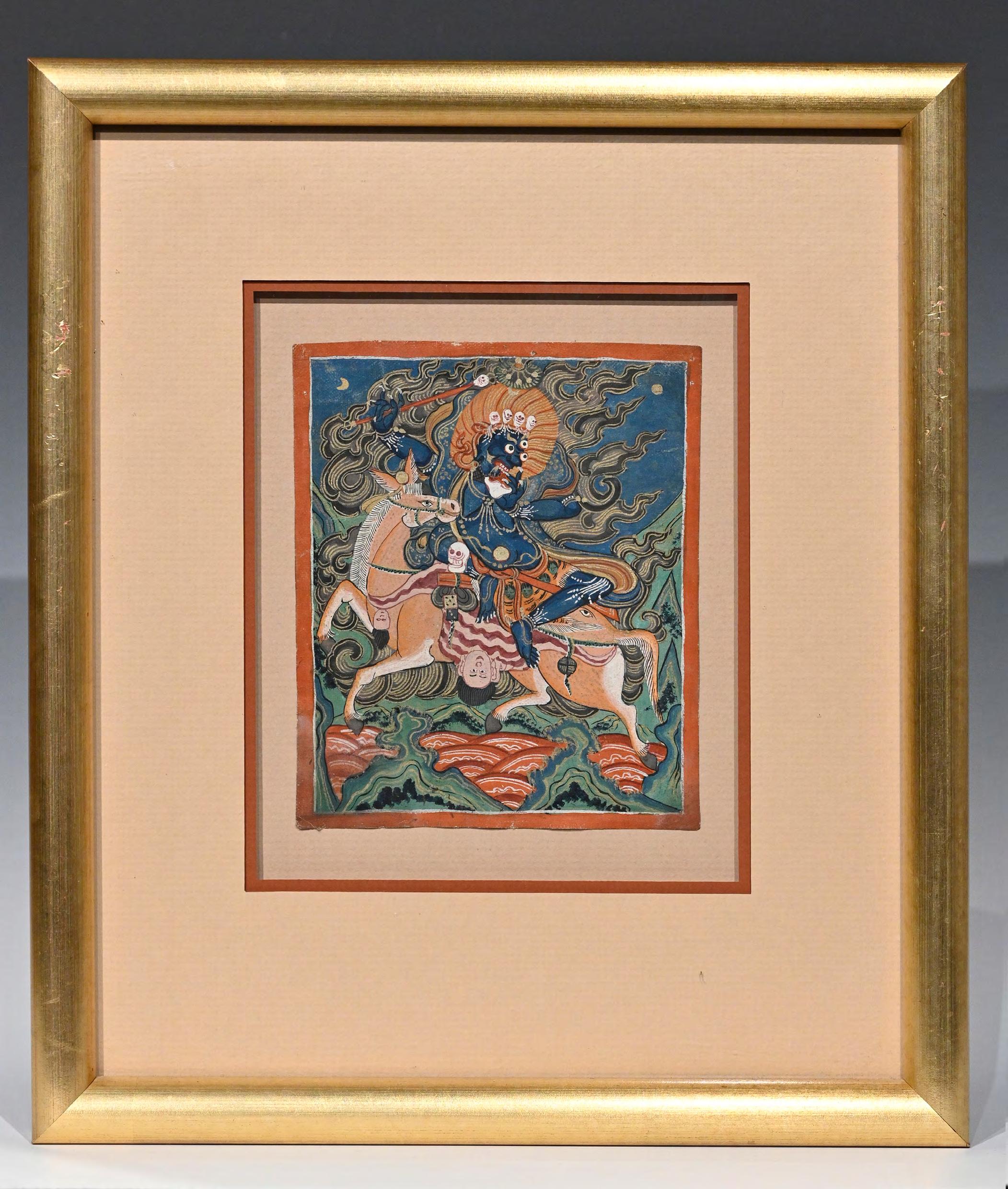
13A painting of a Yab-yum, possibly Red Avalokiteshvara 一張西藏十四至十五世紀雙修手描畫,可能是紅觀音菩薩雙修

Tibet, 14-15th century Mineral pigment and gold on paper 14.5 x 11.5 cm or 5 ¾ x 4 ½ in.
Provenance
Acquired from Suzy Lebasi, Australia on 24 November 2001 Boris Kaspiev, Australia
來源 2001 年 11 月 24 日從蘇西·勒巴斯澳洲收藏購得 鮑里斯·卡斯皮耶夫澳洲收藏
An painting depicting a Avalokiteshvara and his consort in yab-yum.
Script on reverse with blessing and stating number from the set.
For similar style see Sotheby’s Indian and South East Asian sale, New York 21 March 2001 item 153.


A painting of Yamantaka

Mongolia, 19th century Mineral pigment and gold on cloth 13.5 x 10.5 cm or 5 ⅓ x 4 ¼ in Provenance Acquired from Suzy Lebasi, Australia on 03 May 2003 Boris Kaspiev, Australia 來源 2003 年 05 月 03 日從蘇西·勒巴斯澳洲收藏購得 鮑里斯·卡斯皮耶夫澳洲收藏
A fine Mongolian Burhany Zurag of Vajrabhairava and his consort Vajravetali in their sensuous state. Vajrahhairava has nine heads,34 arms and 16 legs. The main head is a buf falo, seven are guardian heads, surmounted by Manjusri, the benign manifestation of Va jrabhairava. His principal hands hold the kapala and chopper. The other radiating hands with ritual attributes: ghanta, trident, sword, arrow, bow, lasso, danda, parasol, Bhrama’s head ,vajra, khavanga. He stands in alidhasana, trampling on heavenly deities, birds and animals, symbolizing his control over evil and ignorance. His consort Vajravetali, in his embrace, holds the ghanta and chopper in her hands. Both divine figures worn a garland of severed human heads and skulls. Blessing on reverse.



15A painting of Gelupa lamas, Maitreya and other deities 一張西藏十八世紀格魯派手描畫

Tibet, 18th century Mineral pigment and gold on cloth 12.5 x 10 cm or 5 x 4 in.
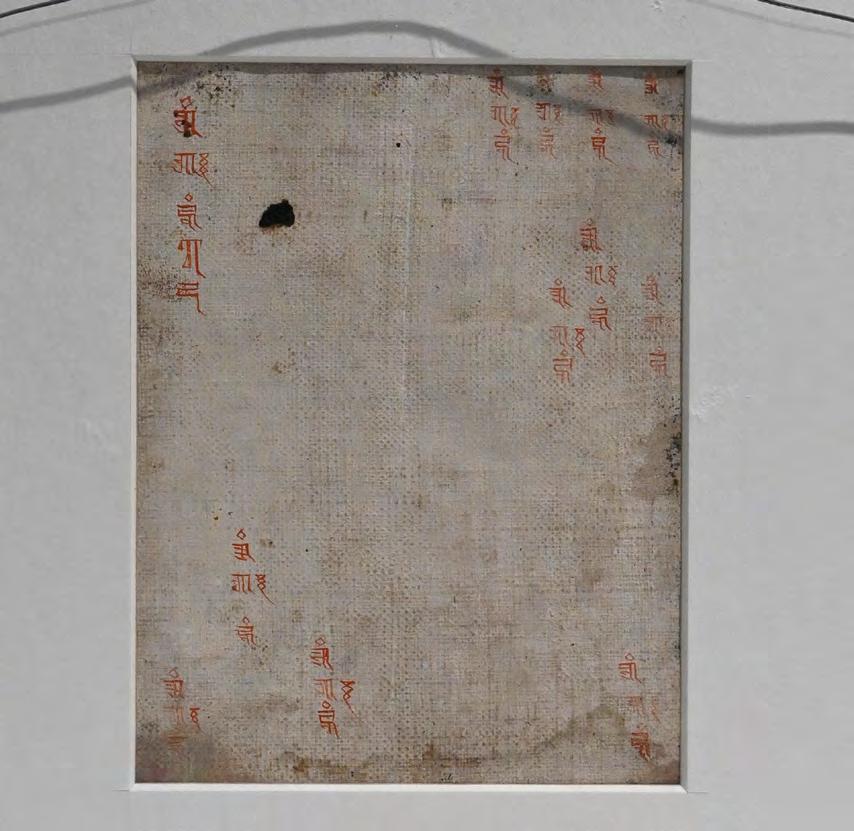
Provenance Acquired from Suzy Lebasi, Australia on 09 September 2000 Boris Kaspiev, Australia 來源 2000 年 09 月 09 日從蘇西·勒巴斯澳洲收藏購得 鮑里斯·卡斯皮耶夫澳洲收藏
The fine painting, possibly for a portable shrine, depicts (top right) Maitreya, the Bud dha of the Future, and to his left, Vajrasattva, Sakyamuni, Vairocana, and Amitabha; they hover on lotus thrones above a cloud surrounding Tsongkapa and his two disciples. To the centre right is Yamantaka, then Bhairava; and to the bottom left are Yama and Yami, and to the very lower edge is a donor monk. Extensive blessings on reverse.


16

A painting of wrathful Tara and two deities 一張西藏或蒙古十九世紀度母手描畫

Tibet or Mongolia, 19th century Mineral pigment and gold on cloth 17.8 x 13 cm / 7 x 5 ⅛ in.
Provenance Acquired from Suzy Lebasi, Australia on 24 May 2006 Boris Kaspiev, Australia
來源 2006 年 05 月 24 日從蘇西·勒巴斯澳洲收藏購得 鮑里斯·卡斯皮耶夫澳洲收藏

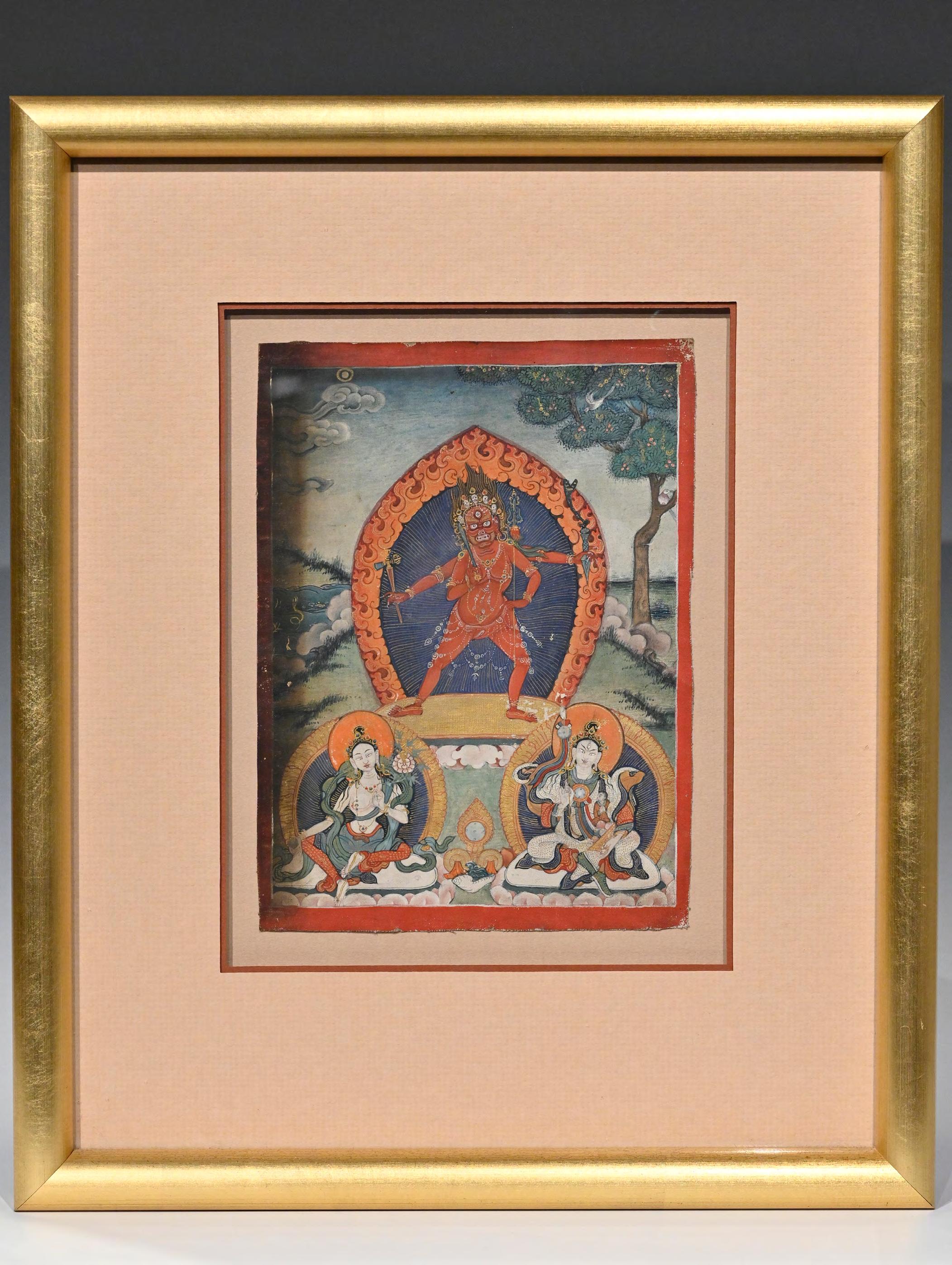
17

A painting depicting Wrathful deity 一張西藏約十七世紀忿怒尊手描畫
Tibet, ca. 17th century Mineral pigment and gold on paper 11.5 x 9 cm or 4 ½ x 3 ½ in.
Provenance Purchased at the Tibetan Gallery, Wyndham road, Central, Hong Kong on 31 March 2006 Boris Kaspiev, Australia 來源 2006 年 03 月 31 日購自於香港 Tibetan Gallery 鮑里斯·卡斯皮耶夫澳洲收藏
A fine painting of a tantric wrathful male deity with three bulging eyes, adored with fiveskull crown, holding two horns in his hands and sitting on leopard skin.


18A manuscript page of two deities possibly form of Prajnaparamita and Tara 一張喜馬拉雅西部十三至十四世紀菩薩手抄描經
Western Himalaya, 13-14th century Gold and Mineral pigment on blue-black background paper 17 x 12.5 cm / 6 ¾ x 5 in.
Provenance
Acquired from Suzy Lebasi, Australia on 13 November 2004 Boris Kaspiev, Australia 來源 2004 年 11 月 13 日從蘇西·勒巴斯澳洲收藏購得 鮑里斯·卡斯皮耶夫澳洲收藏
An illustration from a Buddhist manuscript, depicting a deity on each side of the manu script. One with 18 arms holding attributes. A fine and rare early illumination from a manuscript. It is painted on a blue-black background, with blue, pink, white and silvery inks creating a translucent effect with the deities shimmering from a dark background. The style is Western Himalayan, with similarities with paintings and sculptures from Kashmir, Himachal Pradesh, Alchi, Tabo – especially the three-pointed crown, jewelry and clothing.




A compendium manuscript book 一本蒙古十九至二十世早期世紀五十多頁畫冊子

Mongolia, late 19th - early 20th century Mineral pigment and gold on paper, bind with silk 29 x 9 cm / 11.5 x 3 ¾ in. Total of 50 plus pages
Provenance
Acquired from Suzy Lebasi, Australia on 20 May 2006 Boris Kaspiev, Australia 來源 2006 年 05 月 20 日從蘇西·勒巴斯澳洲收藏購得 鮑里斯·卡斯皮耶夫澳洲收藏
A Tibetan Buddhist book or manuscript. This manuscript is finely painted on paper, and is complete and intact. It has (worn) silk covers decorated with Buddhist symbols. When purchased, inside the manuscript were several painting and woodblock prints, and these remain. The script is in Mongolian, and has a number of fine illustrations throughout.







20
A group of thirteen paintings of ritual symbols 一套十三張西藏十七世紀法事手描畫

Tibet, 17th century Mineral pigment on paper 13 x 10 cm / 5 x 4 in.

Provenance Acquired from Suzy Lebasi, Australia on 22 September 2013 Boris Kaspiev, Australia 來源 2013 年 09 月 22 日從蘇西·勒巴斯澳洲收藏購得 鮑里斯·卡斯皮耶夫澳洲收藏
These painting appear to belong to the same series, several are slightly different and may either belong to another group with the same ritual theme, or were painted slightly later to replace some that were worn. The different painting have text on the reverse whereas the others don’t. The subject matter is interesting and rare. Unframed.












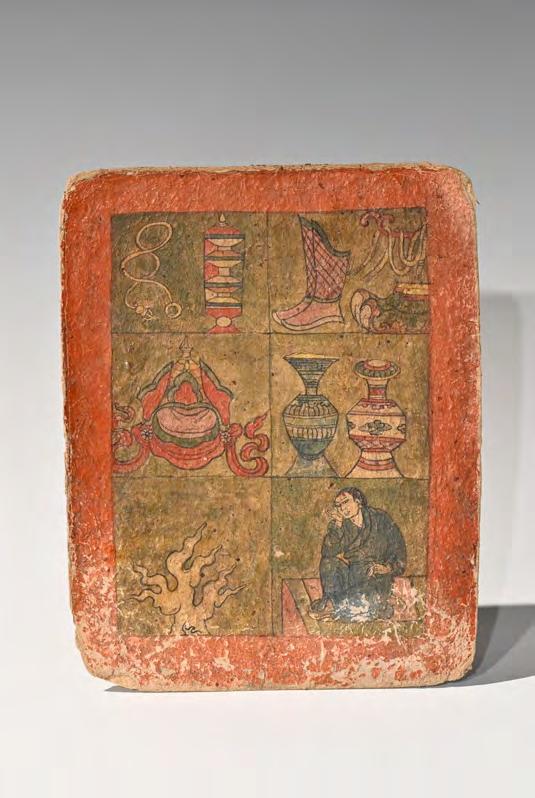

A group of eleven ritual paintings 一套十一張西藏十九至二十世紀法事手描畫

Tibet, late 19th-20th century Mineral pigment on paper Smallest size 7.5 x 5 cm / 3 x 2 in.
Provenance Acquired from Suzy Lebasi Boris Kaspiev, Australia 來源 蘇西·勒巴斯澳洲收藏 鮑里斯·卡斯皮耶夫澳洲收藏













22

A set of eleven paintings depicting Vajrapani manifestations 一套十一張西藏十四世紀金剛手菩薩化身畫
Tibet, ca. 14th century Mineral pigment and gold on paper Each painting approximately 14 x 7.5 cm / 5 ½ x 3 in.

Provenance Acquired from Suzy Lebasi, Australia on 5 November 2002 Boris Kaspiev, Australia
來源 2002 年 11 月 05 日從蘇西·勒巴斯澳洲收藏購得 鮑里斯·卡斯皮耶夫澳洲收藏
A series of 11 painting on paper depicting Vajrapani in different manifestations. Probably Bon. Scripts in reverse.


23

A painting of a wrathful worldly protector 一張蒙古十九世紀忿怒的世俗保護神手描畫
Mongolia, 19th century Mineral pigment and gold on cloth 10 x 8.5 cm / 4 x 3 ⅓ in.

Provenance Acquired from Suzy Lebasi, Australia on 08 May 2010 Boris Kaspiev, Australia 來源 2010 年 05 月 08 日從蘇西·勒巴斯澳洲收藏購得 鮑里斯·卡斯皮耶夫澳洲收藏
An fine Mongolian Burhany Zurag with extensive application of gold outlines and filling. The wrathful deity sits within a skull palace, with skeletons, torsos and heads. Below the central figure are two more deities. A blessing on the reverse. No cleaning or restoration. Given its pristine condition, this painting is likely to have been housed in a gau.


A painting of Vajrapani, Dam Can Vajrasadhu and Dam Can Dorje Legspa 一張蒙古十九世紀金剛手手描畫
Mongolia, 19th century Mineral pigment and gold on cloth 7.5 x 8.5 cm / 3 x 3 3/8 in.


Provenance Acquired from Suzy Lebasi, Australia on 17 February 2013 Boris Kaspiev, Australia 來源 2013 年 02 月 17
This painting would have been commissioned by a wealthy patron. Replete with very fine imagery and lavished with brilliant pigments and burnished gold, it depicts an image of Vajrapani, the wrathful deity standing amid roiling flames, his right hand in the gesture of warning brandishing his symbol, the vajra, his left again in tarjani mudra. He is sur rounded by sentient beings - animals of the charnel grounds, of the fields and the forests, while below him riding on their vehicles are the Dam Can brothers - Dam Can Vajrasa dhu riding a lion and crushing corpses, and Dam Can Dorje Legspa on his goat with the twisted horns. Between them, a crawling skeleton holds aloft a double offering of skull cups filled with offered organs. The reverse with tiny blessings in gold Tibetan script behind each of the deities.


25

A painting of Dam Can Dorje Legspa 一張蒙古十九世紀護法手描畫
Mongolia, 19th century Mineral pigment and gold on cloth 11.5 x 9.5 cm / 4 ½ x 3 ¾ in.

Provenance Acquired from Suzy Lebasi, Australia on 23 September 2013 Boris Kaspiev, Australia
來源 2013 年 09 月 23 日從蘇西·勒巴斯澳洲收藏購得 鮑里斯·卡斯皮耶夫澳洲收藏


Reference
Demonic Divine, Linrothe and Watt, Rubin Museum of Art, 2004

Oracles and Demons of Tibet, de Nebsky-Wojkowitz, Book Faith India 1996
Mongolian Buddhist Art, Volume 1 part 2 Thangkas, Appliques and Embroideries, Serin
Published by Photography and design
Hollywood Galleries Ltd., Hong Kong
Copyright © 2022 by Hollywood Galleries Ltd. All rights reserved.

Andrew Lau
劉惠漢, 何杏根, 劉俊揚

Hon Lau, Ellen Ho, Andrew Lau 東寶齋由劉惠漢夫婦創立於 1985 年,近於香港荷李
Hollywood Galleries was established by Hon Lau and his wife Ellen Ho in 1985, took its base in the ancient sector of Hollywood road near the Hong Kong Man Mo temple where many of the reputable antique shops are centered. They specialized in Buddhist sculptures, paintings and religious works of art with origins from the Himalayas, India, China, and Southeast Asia spanning from 12th to 19th century. Their major expertise is on Tibetan gilt bronze sculptures working in collaboration with private collectors and museums in China and overseas. Their legacy in the art world goes back to the 70’s with Hon’s father’s initiation which set his foundation and inspirations for the next generation. The family business has since been passionately endeavored and continu ously extended.




